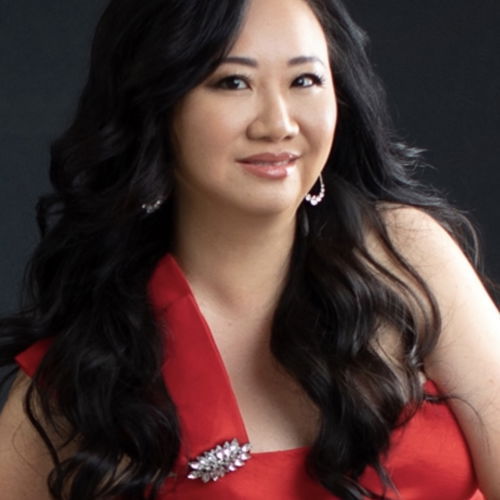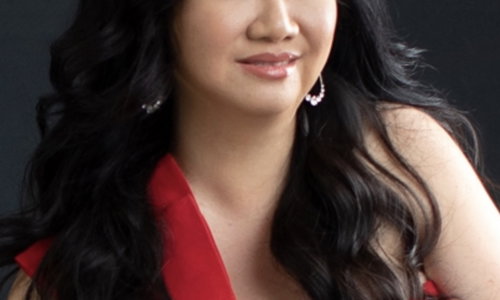Fearless Women of Song
Details
Shirley (Xiao-Ling) Wang full profile / 2 vocalists and a pianist / 3 musicians
Other players: Hui Wu, pianist & Sherry Shaoling, vocalist
Full program notes
Program
Belle nuit, ô nuit d'amour (Barcarolle) from Tales of Hoffmann - Offenbach
“Elle a fui, la tourterelle” from Tales of Hoffmann - Offenbach
“Un bel di” from Madama Butterfly - Puccini
“A Tribute to Clara Schumann: The Eternal Love Affair”
1. Clara Schuman: Sechs Lieder Op.13 (selections)
2. Robert Schuman: Frauenliebe und Leben Op.42 (selections)
3. Brahms Intermezzi Op. 118 No. 1-3 (piano solos)
The Flower Duet from Lakme - Delibes
Ave Maria - Schubert
O Mio Babbino Caro - Puccini
“Marguerite and Her Spirit Sisters”
1. Gretchen am Spinnrade - Schubert
2. L’altra Notte in Fondo Al Mare from Mefistofele - A. Boito
Mu Yang Qu - Traditional Chinese Music
Pamir, My Beautiful Home Land - Chinese Art Song
Lola from Damn Yankees
I Enjoy Being A Girl from Flower Drum Song
Nowadays (duet) from Chicago
Program Note
Welcome to a musical journey that traverses the emotional and cultural landscapes of classical and theatrical music. Each piece in today's program has been chosen for its ability to convey deep emotions and stories, offering a window into the composers' souls and the eras they shaped.
We open with Offenbach's "Belle nuit, ô nuit d'amour" (Barcarolle) from Tales of Hoffmann, a piece that perfectly encapsulates the beauty and drama inherent in Offenbach's music. This is followed by Mozart's "Deh, vieni, non tardar" from Le Nozze di Figaro, an aria that stands as a testament to Mozart's genius in capturing the essence of love and longing.
Puccini's "Un bel dì" from Madama Butterfly and "O Mio Babbino Caro* invite us into the hearts of their protagonists, showcasing Puccini's gift for emotional expression. Delibes' The Flower Duet from Lakme and Schubert's Ave Maria further explore the power of vocal music to convey profound feelings.
Our tribute to Clara and Robert Schumann alongside Brahms’ piano solo selections highlights the interconnected lives and emotions of these composers through selections that explore love and longing. "Marguerite and Her Spirit Sisters" delves into the narratives of female characters, reflecting their strength and vulnerability.
The program also embraces cultural diversity with "Mu Yang Qu," traditional Chinese music, and "Pamir, My Beautiful Home Land," celebrating the rich musical heritage of China. We conclude with a vibrant selection from musical theatre, including pieces from Damn Yankees, Flower Drum Song, and Chicago, showcasing the genre's ability to entertain and uplift.
Each selection today invites you on a journey through love, longing, and the pursuit of beauty, offering a diverse tapestry of musical expressions. Join us as we explore these timeless themes through the universal language of music.
Historical context
This program is a journey through the musical traditions that weave together the rich tapestry of our collective history. Each piece selected represents a distinct period or style, offering a glimpse into the cultural and emotional landscapes of its time.
We begin with Offenbach's Barcarolle from Tales of Hoffmann, a testament to the 19th-century Romantic era's fascination with emotion, drama, and the supernatural. Offenbach's influence on the operetta genre highlights a blend of operatic sophistication and popular appeal.
Mozart's "Deh, vieni, non tardar" from Le Nozze di Figaro brings us to the Classical era, where balance and clarity in music met with complex emotional narratives, revolutionizing opera and setting new standards for musical storytelling.
Puccini's arias from Madama Butterfly and Gianni Schicchi represent the late Romantic period's move towards more emotive and expressive music, setting the stage for modern musical theater with their lush melodies and deep emotional content.
The selections from Clara Schumann, Robert Schumann, and Johannes Brahms delve into the Romantic era's exploration of emotion and individualism, highlighting the era's intricate personal and professional networks and the significant, though often overlooked, contributions of women in music.
Delibes' The Flower Duet and Schubert's Ave Maria continue our exploration of the Romantic fascination with nature and the divine, showcasing the period's capacity for musical transcendence.
By including traditional Chinese music with "Mu Yang Qu" and "Pamir, My Beautiful Home Land," we celebrate the diversity of musical expression and the unique beauty and spirit of Chinese cultural heritage.
We conclude with a nod to American musical theater, a genre that encapsulates the fusion of operatic, jazz, and popular music traditions, reflecting music's enduring ability to evolve, adapt, and inspire across generations.
This program is more than a concert; it's an homage to the enduring power of music to connect us to the long story of human expression, emotion, and community through the ages. From classical masterpieces to the vibrant energy of musical theater, we celebrate the legacy and ongoing evolution of these musical traditions.
Videos from this player
Other programs from this ensemble
Echoes of Voice, Viola and Piano
- Musician profile: Shirley (Xiao-Ling) Wang
-
Instruments: Voice, viola and piano
- Musicians: Shirley (Xiao-Ling) Wang, Shirley Wang, June Xu and Apple Lin
Schubertiade, Voice & Guitar Duo/Solos
- Musician profile: Shirley (Xiao-Ling) Wang
-
Instruments: Voice and guitar
- Musicians: Shirley (Xiao-Ling) Wang, Eric Coffey
- Musician profile: Shirley (Xiao-Ling) Wang
-
Instruments: Erhu, Guzheng and Western Operatic Voice
- Musicians: Shirley (Xiao-Ling) Wang, XiaoBo Li (Erhu), Su She (guzheng), Shirley Wang, Western Operatic Soprano

 Continue with Facebook
Continue with Facebook
 Continue with Google
Continue with Google
 Continue with Apple
Continue with Apple

